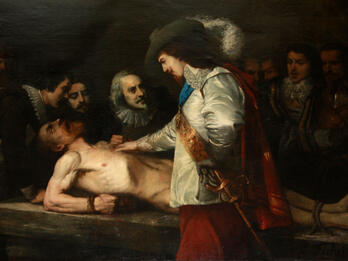The Diaspora: Construction of Jewish History
Heinrich Graetz
1846
This is the eighteen-hundred-year era of the diaspora, of unprecedented suffering, of uninterrupted martyrdom without parallel in world history. But it is also a period of spiritual alertness, of restless mental activity, of indefatigable inquiry. In order to sketch a clear and appropriate picture of this period, one would have to draw a two-sided…
Creator Bio
Heinrich Graetz
The historian and biblical scholar Heinrich (Hirsch) Graetz was born in Xions, Grand Duchy of Posen, Prussia (now Ksiąaż Wielkopolski, Poland), and received a yeshiva education. As a young man, he was strongly influenced by his friendship with the founding thinker of modern Orthodoxy, Samson Raphael Hirsch, and his idea that it was possible to combine stringent observance and traditional learning with modern intellectual life. Drawn to historical study, Graetz studied at Breslau University (which did not grant doctorates to Jews) and defended his dissertation on Gnosticism and Judaism at the University of Jena. He began teaching Jewish history and Bible at the new Jewish Theological Seminary of Breslau in 1853, the same year that the first volume appeared of his comprehensive history of Jews, Geschichte der Juden von den ältesten Zeiten bis zur Gegenwart (History of the Jews from Ancient Times to the Present). Graetz’s History, the first work by a university-trained historian of the Jews, was very popular and influential among German Jews. Marked by great learning, it was also permeated by a strong sense of Jewish collective fate, deep admiration for the Jewish tradition, and a fascination with Jews’ ostensible special genius for Leiden und Lernen (“suffering and study”). His career and works, not without controversy, highlighted the growing rift between conservative and liberal Jewish forms of Judaism.
Related Guide
Intellectual and Religious Thought
The Jewish encounter with modernity from 1750 to 1880 engendered a deeply ideological age. Advocates of enlightenment, of liberalism, of revolution against old regimes fought bitter polemics with forces seeking stasis, stability, tradition, and the familiar strata of privilege.
Related Guide
Scholarship and Science
The scholarly and scientific ethos permeated Jewish intellectual life in the late eighteenth and nineteenth centuries and resulted in contributions obscure and renowned. The foundations of the astonishing breakthroughs of Jews in the sciences in the twentieth century were laid in this period.
You may also like
Rabbinical Anthology

Harvey Demonstrating the Circulation of the Blood to Charles I
Moreh nevukhe ha-zeman (Guide for the Perplexed of Our Time)
- The…


